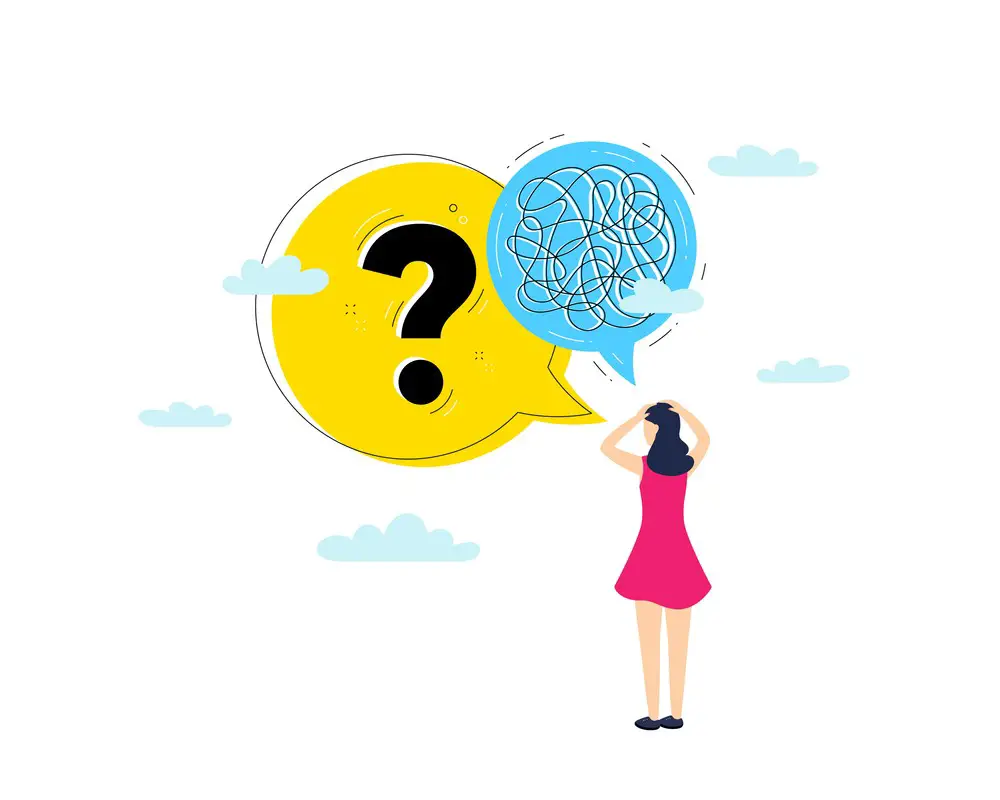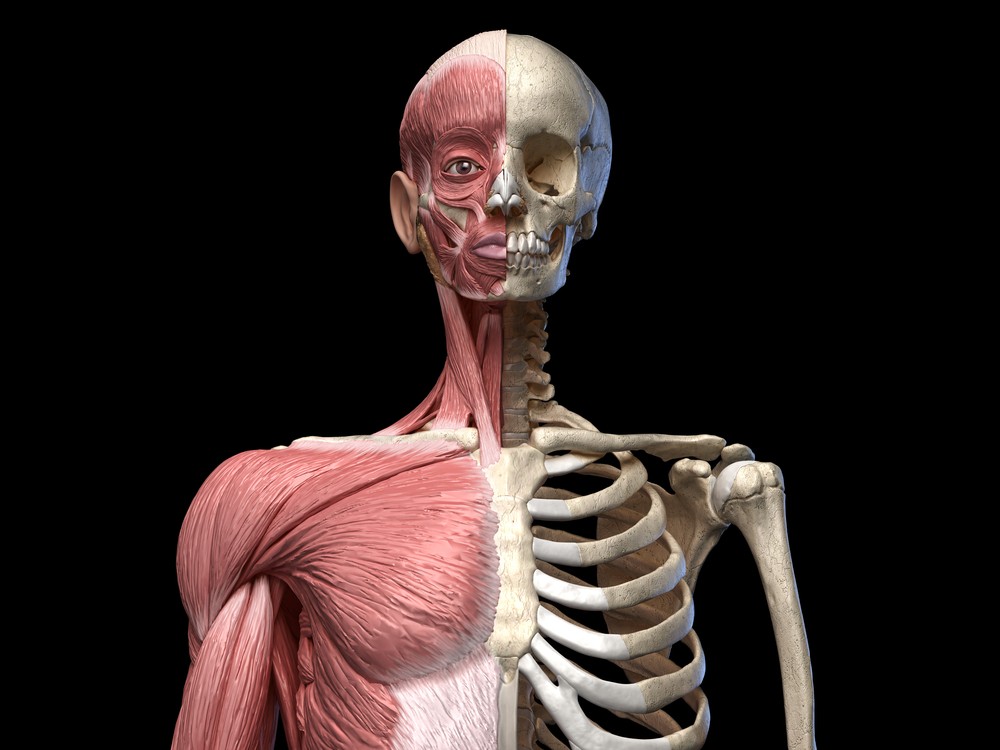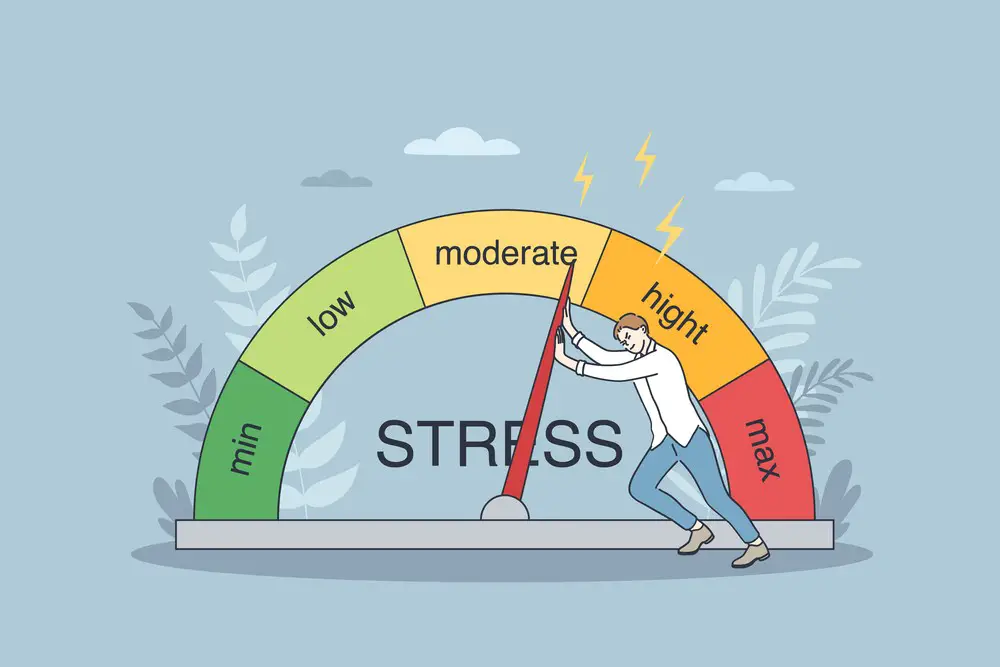As a BetterHelp affiliate, we receive compensation from BetterHelp if you purchase products or services through the links provided
Stress is an everyday occurrence that can wreak havoc on our bodies, particularly our musculoskeletal system. This system comprises bones, muscles, tendons, ligaments, and connective tissues that work in tandem to provide our bodies with support, stability, and mobility. As a result of stress, our nervous system signals our bodies to release stress hormones like adrenaline, noradrenaline, and cortisol, which can trigger physiological changes that affect our musculoskeletal system.
One of the ways stress affects the musculoskeletal system is by causing muscle tension. This tension can lead to muscle pain or spasms and, in some cases, even restrict movement. Prolonged stress can also result in chronic muscle tension, further exacerbating pain and discomfort. This is particularly concerning because the musculoskeletal system is crucial to our overall well-being and ability to function in daily activities.
Understanding stress’s impact on our musculoskeletal system is essential to implement stress management and coping strategies that help maintain overall health and well-being. Finding ways to relieve stress can lessen its impact on our bodies and maintain a healthy musculoskeletal system.
Key Takeaways
- Stress affects the musculoskeletal system, causing muscle tension and pain
- Prolonged stress can lead to chronic muscle tension and impact daily functioning
- Implementing stress management techniques can help maintain a healthy musculoskeletal system
 Understanding Stress
Understanding Stress
Physical and Psychological Aspects
Stress is a natural physical and psychological response to various life challenges. It occurs when the body perceives a situation as harmful or overwhelming, leading to a “fight or flight” response. Stress can affect both the mind and body. In some cases, stress can motivate individuals to be more productive, while in other cases, it can interfere with day-to-day functioning and negatively impact overall health.
Stress Hormones: Cortisol and Adrenaline
When the body experiences stress, it releases hormones such as cortisol and adrenaline. Cortisol helps regulate metabolism and blood sugar levels, while adrenaline increases heart rate, blood pressure, and energy levels. These hormones are beneficial in short-term stress situations by allowing the body to react quickly to potential threats. However, if these hormones persist over a longer period, they can negatively affect the body, causing damage to various systems, including the musculoskeletal system.
Stress Symptoms
Stress affects various systems of the body, leading to different symptoms. Some common symptoms include:
- Rapid heartbeat
- Frequent headaches or migraines
- Digestive problems
- Insomnia or difficulty sleeping
- Difficulties concentrating or constant worrying
- Fatigue and muscle tension
- Mood swings and irritability
Types of Stress: Acute and Chronic Stress
There are two types of stress: acute and chronic. Acute stress is a short-term stress response to a specific event. It can be beneficial in certain situations, such as meeting a deadline or preparing for a presentation. However, chronic stress is prolonged, ongoing stress that can negatively affect mental and physical health.
Acute Stress: This type of stress is typically short-lived and can be a reaction to situations such as a traffic jam, an argument, or an unexpected challenge at work. Acute stress can cause temporary physical symptoms like increased heart rate and rapid breathing. Acute stress can be manageable in small doses and may improve performance in challenging situations.
Chronic Stress: This type of stress continues for a long time and can harm the body and mind. Chronic stress can result from persisting issues like a challenging work environment, financial difficulties, or ongoing relationship problems. Over time, chronic stress can contribute to serious health problems, including high blood pressure, heart disease, obesity, diabetes, and negative impacts on the musculoskeletal system.
The Musculoskeletal System
 Structure and Function
Structure and Function
The musculoskeletal system is a complex network of bones, cartilage, ligaments, tendons, and connective tissues. It is essential to support the body’s weight, maintain posture, and enable movement. This system allows us to perform daily activities – from walking and lifting objects to more specialized tasks requiring skill and precision.
Bones provide a rigid framework for our body, while cartilage cushions the joints and allows smooth movement. Ligaments and tendons hold the bones together and connect muscles to bones, respectively. The connective tissues, including fascia, bind these structures and contribute to the overall stability and flexibility of the body.
Muscles, Bones, and Connective Tissues
The musculoskeletal system consists of various components that work together to provide strength, support, and protection to our body. The three primary components are:
- Muscles: These are the tissues responsible for generating force and initiating movement. They can contract, lengthen, and provide stability to the body. Skeletal muscles are connected to bones by tendons and work in opposing pairs to facilitate various movements.
- Bones: The hard, rigid structures that provide stability and protection to our body’s organs. Bones have a dense outer layer (cortical bone) for strength and a spongy inner layer (trabecular bone) for shock absorption. They are crucial for forming body structure, and their length and density can be influenced by factors such as genes, nutrition, and hormones.
- Connective tissues: These tissues comprise various components like collagen, elastic fibers, and proteoglycans. They surround and bind multiple parts of the musculoskeletal system, such as muscles, bones, ligaments, and tendons. Connective tissues contribute to the musculoskeletal system’s overall resilience and integrative properties, ensuring smooth and coordinated movements.
 Impact of Stress on The Musculoskeletal System
Impact of Stress on The Musculoskeletal System
Muscle Tension and Pain
Stress affects the musculoskeletal system by causing muscle tension. When stressed, our muscles tend to tense up, leading to muscle stiffness and even pain. This muscle tension can be so severe that it results in a painful condition known as muscle spasm. Prolonged muscle tension can also contribute to chronic pain, making it difficult to carry out daily activities.
Stress-Induced Musculoskeletal Disorders
Under chronic stress, the body’s ability to handle stress becomes compromised, leading to musculoskeletal disorders. Examples of these disorders include low back pain, osteoarthritis, and widespread musculoskeletal pain. These conditions may be exacerbated by negative emotions such as anxiety and depression, as they are associated with lower pain thresholds.
Influence of Chronic Stress
Chronic stress can harm the musculoskeletal system, leading to a vicious cycle of pain and stress. As stress continues to affect the body, it contributes to the development and worsening of musculoskeletal disorders. At the same time, the presence of pain and discomfort further amplifies the stress levels. This cycle of stress and pain can prove challenging to break, making it essential to address both physical and emotional aspects of stress for overall musculoskeletal health.
Stress and Other Body Systems
Stress and the Cardiovascular System
Stress can have adverse effects on the cardiovascular system. When a person experiences stress, their body releases hormones like cortisol and adrenaline. These hormones cause an increase in heart rate and blood pressure, which can lead to more strain on the heart and blood vessels. Over time, chronic stress may contribute to the development of heart disease or even heart attacks.
Stress and the Digestive System
The digestive system is also affected by stress. Increases in stress hormones can cause changes in digestion, such as slowed or accelerated food movement through the gastrointestinal tract. This may lead to symptoms like indigestion, heartburn, diarrhea, or constipation. Additionally, stress can increase appetite, potentially leading to overeating and weight gain.
Stress and the Nervous System
Stress impacts the nervous system, particularly the “fight-or-flight” response. This response is designed to help the body react to potentially dangerous situations, but chronic activation due to everyday stress can have negative consequences. Prolonged stress can cause an imbalance in neurotransmitters and may contribute to anxiety, depression, and other mood disorders.
Stress and the Endocrine System
The endocrine system is responsible for releasing hormones in response to stress. While this system is designed to help the body cope with stress, chronic stress can lead to hormonal imbalances. Elevated cortisol levels, in particular, may lead to symptoms such as fatigue, mood swings, and difficulty concentrating.
Stress and the Respiratory System
Stress often affects The respiratory system, as rapid breathing or shortness of breath can be common physical symptoms. Stress may also aggravate pre-existing respiratory conditions like asthma, and chronic stress can weaken the immune system’s ability to protect against respiratory illnesses like the flu.
Stress and the Reproductive System
Lastly, stress can impact the reproductive system. Chronic stress may lead to disruptions in the menstrual cycle and even contribute to fertility issues in women. Stress can cause impotence or reduce testosterone levels in men, potentially affecting libido and overall sexual health.
 The Psychological and Physical Effects of Stress
The Psychological and Physical Effects of Stress
Mental Health and Well-being
Stress affects individuals both psychologically and physically. It can significantly impact a person’s mental health and well-being. When stress levels are high, a person might experience increased anxiety, depression, irritability, and difficulty concentrating. Psychological symptoms of stress may also lead to changes in behavior, such as overeating or undereating, social withdrawal, and disrupted sleep patterns.
Physical Health and Chronic Diseases
In addition to its psychological effects, stress can have numerous physical repercussions. One of the systems that stress affects is the musculoskeletal system, and chronic stress can lead to chronic pain in muscles and joints. The nervous system intimately connects these two systems, allowing stress to wreak havoc on one’s muscles, bones, and overall physical health.
Furthermore, stress can contribute to chronic diseases like heart disease and obesity. For instance, when high-stress levels, a person might experience chest pain, heartburn, and digestive problems. These uncomfortable stress symptoms can lead to more severe health issues if left unchecked. High blood pressure, diabetes, and other health problems can arise due to long-term stress.
Stress affects various systems within the body, from mental health and well-being to physical health and chronic diseases. Recognizing and managing stress properly is essential to prevent or reduce its detrimental effects on our overall health.
 Stress Management and Coping Strategies
Stress Management and Coping Strategies
Relaxation Techniques
Relaxation techniques are essential for managing stress and improving one’s musculoskeletal system. These include deep breathing exercises, meditation, yoga, reading, humor, and music. Engaging in hobbies that promote relaxation can also help alleviate stress. Practicing these relaxation techniques regularly can lead to better stress management, decreased muscle tension, and overall improved well-being.
Physical Activity and Exercise
Regular physical activity and exercise are crucial components of stress management. Aerobics, yoga, strength training, and other forms of exercise help to release stress-reducing hormones, decrease muscle tension, and improve mood. It’s crucial to find an enjoyable activity to incorporate into one’s daily routine for effective stress relief and long-term musculoskeletal health.
Balanced Diet and Healthy Lifestyle Choices
Maintaining a balanced diet rich in fruits and vegetables can help manage stress levels and promote a healthy musculoskeletal system. Consuming the proper nutrients and avoiding excessive intake of alcohol and tobacco products can significantly impact one’s overall well-being. In addition, getting adequate sleep is crucial for appropriate stress management and musculoskeletal health.
Psychological Support
Seeking psychological support from friends, family, or support groups can aid in stress management. Sharing feelings and discussing stressors may help release emotional tension and provide relief to the musculoskeletal system. Establishing a strong social support network is crucial for managing stress effectively and maintaining overall health.
 Professional Help
Professional Help
In some cases, professional help from a counselor, therapist, masseuse, or physiotherapist may be required to manage stress and address its impact on the musculoskeletal system. A healthcare provider can offer guidance in stress management techniques, recommend appropriate therapies, and help individuals develop a personalized plan to reduce stress and improve overall well-being.
When Professional Therapy is Necessary for Stress Management
While everyone encounters stress at some point in their lives, there are instances where its magnitude or persistence demands professional intervention. Recognizing the signs that you may need more structured help can be pivotal for your overall well-being.
- Persistent Physical Symptoms: When stress manifests as chronic headaches, muscle tension, or digestive issues that don’t abate with standard stress relief methods, it might be time to seek a therapist’s guidance.
- Overwhelming Emotions: Feeling consistently overwhelmed, unable to cope, or experiencing extreme mood swings are strong indicators that professional help may be beneficial.
- Disrupted Daily Functioning: If stress impedes daily tasks, work responsibilities, or interpersonal relationships, it’s a clear sign that one should consider therapeutic intervention.
- Recurring Negative Thought Patterns: Constant feelings of worthlessness, pervasive pessimism, or recurrent thoughts of self-harm or suicide are immediate red flags necessitating professional help.
- Reliance on Unhealthy Coping Mechanisms: Turning to substances like alcohol, drugs, or engaging in other risky behaviors to cope with stress suggests that one may need more structured support.
While stress is inherent in life, its severe or chronic forms shouldn’t be endured silently. Professional therapists offer a safe space to explore feelings, develop coping mechanisms, and regain control over one’s life. If you or someone you know exhibits these signs, reaching out for professional help can be transformative.
Final Thoughts
Stress has a significant impact on the musculoskeletal system. When a person experiences stress, their muscles tend to tense up as a reflex reaction, a natural response to protect against injury and pain. This muscle tension can lead to discomfort and, in some cases, painful muscle spasms.
It is essential to recognize that stress affects a person’s mental well-being and physical health. The hormones released during periods of stress can have adverse metabolic effects on skeletal muscle function. This can lead to an earlier decline in muscle strength, potentially resulting in falls, fractures, and increased risk of disability or other co-morbid conditions, particularly in the geriatric population.
Addressing and managing stress is essential for maintaining a healthy musculoskeletal system. Effective stress reduction techniques include engaging in regular physical activity, practicing relaxation techniques, seeking social support, and ensuring adequate sleep. Incorporating these practices into daily life can contribute to healthier muscles, joints, and overall well-being.
Understanding the connection between stress and the musculoskeletal system is crucial for maintaining optimal physical health. By recognizing the impact of stress and implementing strategies to manage it, people can work towards a healthier, more balanced lifestyle.
Frequently Asked Questions

How do stress hormones impact muscles and joints?
Stress hormones, such as cortisol, epinephrine, and norepinephrine, are released during stress and have various effects on the body. These hormones can cause an increase in muscle tension and may lead to inflammation within the joints, resulting in pain and discomfort.
Can chronic stress lead to musculoskeletal pain?
Chronic stress can contribute to the development of musculoskeletal pain through prolonged muscle tension and increased inflammation. Additionally, stress may cause an imbalance in bodily functions, leading to a weakened immune system, making an individual more susceptible to musculoskeletal issues.
What are common stress-related musculoskeletal disorders?
Some common stress-related musculoskeletal disorders include tension headaches, temporomandibular joint (TMJ) disorders, and neck, shoulder, or lower back pain. These conditions typically result from prolonged muscle tension due to stress and can cause significant discomfort.
How does stress contribute to muscle tension?
Stress activates the body’s “fight or flight” response, increasing heart rate, blood pressure, and muscle tension. This muscle tension prepares the body for the perceived threat but can also lead to pain and discomfort if the tension is prolonged.
Can stress-induced muscle tension lead to injury?
Stress-induced muscle tension can potentially lead to injury over time. Prolonged muscle tension can cause fatigue and strain, increasing the risk of musculoskeletal injuries such as sprains or strains. Chronic muscle tension may also contribute to developing conditions like tendinopathy or muscle imbalances, making an individual more prone to injury.
What relaxation techniques help alleviate stress-related musculoskeletal issues?
Relaxation techniques may help to reduce stress and alleviate musculoskeletal issues. Some effective methods include deep breathing exercises, progressive muscle relaxation, mindfulness meditation, and practicing yoga. These approaches can help to relax the mind and body, reducing muscle tension and promoting overall well-being.
About Me
I’m Jacob Maslow, venturing into the intricate relationship between stress and the musculoskeletal system, drawing insights from research and my journey. I rely on Lexapro to balance my mental health and am well-versed in the therapeutic realm, having embraced its merits firsthand.
Life’s challenges have been many; my ex, under a cloud of narcissism, has held our children away from me, defying court orders and eroding our once profound bond. Daily, I find solace in long walks, a meditative exercise that helps clear the emotional clutter.
Writing has been my beacon, channeling my experiences to enlighten others on mental health and the abyss of narcissism. With a belief anchored in resilience and understanding, I champion the cause that anyone can rise above their mental health adversities. Additionally, my legal platform is a guiding light for those trapped in marital conflicts, especially when children are unjustly used as emotional shields. I aspire to be a beacon of hope and guidance through words and action.
- 3 Ways Wearing a Hat Can Help Lower Your Stress Levels - April 19, 2025
- Breaking the Silence: Why Men’s Mental Health Matters More Than Ever - April 15, 2025
- How to Transform a Home’s Patio Space into a Relaxing Space - March 23, 2025
This site contains affiliate links to products. We will receive a commission for purchases made through these links.


 Understanding Stress
Understanding Stress Structure and Function
Structure and Function Impact of Stress on The Musculoskeletal System
Impact of Stress on The Musculoskeletal System Stress Management and Coping Strategies
Stress Management and Coping Strategies Professional Help
Professional Help
